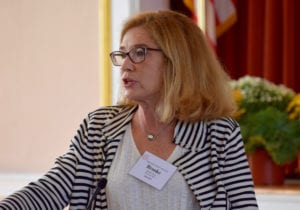Who is a member?
Our members are the local governments of Massachusetts and their elected and appointed leadership.

Brooke Nash, branch chief of the municipal waste reduction program at the Massachusetts Department of Environment Protection, speaks about the Recycle Smart initiative to reduce contaminated recyclables through education during the Massachusetts Mayors’ Association meeting.
Solid waste and recycling in Massachusetts were the focus of the Sept. 26 meeting of the Massachusetts Mayors’ Association in Braintree, which included a presentation by Massachusetts Department of Environmental Protection Commissioner Martin Suuberg.
Suuberg provided an update on the state’s current Solid Waste Master Plan, which covers 2010-2020. In 2016, he said, the state reached the halfway point toward meeting its goal of reducing solid waste by 30 percent, or 2 million tons.
Massachusetts currently produces 4.6 million tons of solid waste per year, according to MassDEP, with 1.2 million tons directed to landfills, 3.2 million tons processed via combustion, and 200,000 tons exported.
Suuberg said his department is beginning to draft the Solid Waste Master Plan for the next decade and invites stakeholder feedback, which can be sent to dep.swmp@mass.gov.
The MMA participates in the Solid Waste Advisory Committee and provides comments on the draft plan and related matters.
Brooke Nash, branch chief for MassDEP’s Municipal Waste Reduction Program, explained the recycling education programs and grant opportunities for municipalities that the agency has rolled out over the past few months. These include the new Recycle Smart website, which explains what can and cannot be recycled, and the Recycling Dividends Program, through which $2.6 million was awarded to municipalities in August.
Julia Greene, a municipal assistance coordinator for MassDEP and the former recycling coordinator in Lynn, spoke about the success Lynn had in implementing MassDEP’s Recycling IQ Toolkit. The program gives municipalities the tools to educate residents about how to decrease contamination in the recycling waste stream.
Nineteen communities were awarded $582,000 through the Recycling IQ program this year, including grants as well as 80-plus hours of technical assistance from MassDEP staff. Greene said Lynn used its grant funding to conduct curbside inspections of trash and recycling carts and to leave “gentle” reminders to residents to encourage improvements in recycling practices.
The mayors also heard from Waneta Trabert, director of sustainable materials for Newton, and Marissa Perez-Dormitzer, district recycling coordinator for the Greater New Bedford Regional Refuse Management District. These presenters shared best practices that have worked in the communities they serve to increase participation in the municipal recycling program, which has the additional effect of decreasing solid waste tonnage.